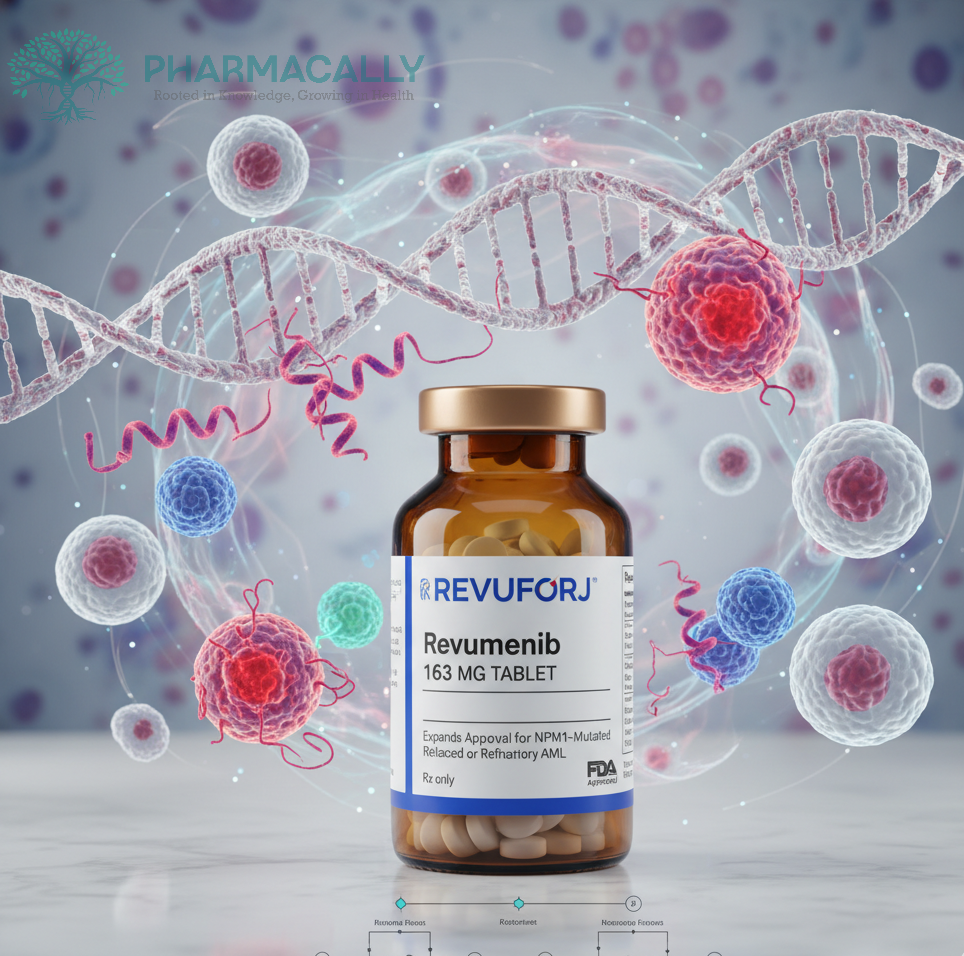Written By: Shreya Bendsure, BPharm
Reviewed By: Pharmacally Editorial Team
On October 24, 2025, the U.S. Food and Drug Administration (FDA) granted an expanded approval to Revumenib (Revuforj) marking a significant milestone in the precision treatment of acute myeloid leukemia (AML). The approval covers adult and pediatric patients aged one year and older with relapsed or refractory AML harboring a susceptible nucleophosmin 1 (NPM1) mutation who have no satisfactory alternative treatments.
Revumenib, developed by Syndax Pharmaceuticals, the drug first received FDA approval in November 2024 for relapsed or refractory acute leukemias with KMT2A translocation, paving the way for its novel mechanism of targeting transcriptional misregulation in aggressive leukemias. This 2025 extension broadens its reach to include NPM1-mutated AML, one of the most common genetic subtypes of the disease.
About Revumenib and Its Mechanism of Action
Revumenib is a selective, oral small-molecule inhibitor of menin, a protein that forms complexes with KMT2A and NPM1 fusion or mutant proteins to drive oncogenic gene expression. By inhibiting menin, Revumenib restores transcriptional balance, halts proliferation, and induces differentiation of leukemic cells providing a targeted therapeutic advantage without the systemic toxicities associated with traditional chemotherapy.
About Acute Myeloid Leukemia (AML)
AML is an aggressive hematologic malignancy arising from abnormal proliferation of immature myeloid cells in the bone marrow.
NPM1-mutated AML represents 30–35% of adult AML cases, often responding poorly to existing therapies upon relapse. Patients with relapsed or refractory (R/R) AML generally face bleak outcomes, emphasizing the need for targeted, mutation-specific therapies.
Key Clinical Evidence: AUGMENT-101 Trial
The FDA approval was supported by data from the AUGMENT-101 trial (SNDX-5613-0700; NCT04065399), an open-label, and multicenter Phase 2 study evaluating Revumenib in patients with NPM1-mutated R/R AML.
The AUGMENT-101 trial was a Phase 1/2, open-label, multicenter, single-arm study designed to evaluate the safety, tolerability, and efficacy of revumenib (Revuforj) in patients aged one year or older with relapsed or refractory acute myeloid leukemia (R/R AML) driven by NPM1 mutations or KMT2A rearrangements. The trial was conducted across 22 global clinical sites and included both adult and pediatric participants who had exhausted available treatment options such as chemotherapy, venetoclax, or allogeneic stem cell transplantation. Phase 1 of the trial used a dose-escalation design to establish the recommended Phase 2 dose (RP2D), while Phase 2 comprised indication-specific expansion cohorts, including one exclusively for NPM1-mutated AML. Patients received oral Revumenib 163 mg twice daily (dose adjusted for pediatric patients weighing under 40 kg) and were allowed to continue treatment until disease progression, unacceptable toxicity, or withdrawal. Mutation status was established using next-generation sequencing (NGS) or PCR-based assays targeting NPM1 exon regions. The key primary endpoints were complete remission (CR) and complete remission with partial hematologic recovery (CRh) rates, alongside duration of remission and transfusion independence. Secondary and exploratory endpoints included overall response rate (ORR), time to response (TTR), survival outcomes, and transplantation rates following response. Safety and tolerability were judged per CTCAE version 5.0 criteria.
The combined CR + CRh rate among patients with NPM1-mutated AML was 23.1%, with a median duration of remission of 4.5 months and a median time to response of 2.8 months. Notably, 17% of initially transfusion-dependent patients achieved transfusion independence within eight weeks of therapy initiation. Expanded findings from the 2025 European Hematology Association (EHA) presentation revealed an overall response rate (ORR) of 48.1%, with consistent responses across age groups, prior transplant history, and venetoclax treatment background. Subgroup analysis showed CR/CRh rates of 43.8% in venetoclax-naïve versus 16.7% in venetoclax-pretreated patients, demonstrating retained responsiveness even in heavily pretreated populations. Additionally, five patients proceeded to allogeneic hematopoietic stem cell transplantation (HSCT) after achieving remission, and three resumed Revumenib post-transplant to maintain disease control. These results confirmed the drug’s meaningful activity and tolerable safety profile in a difficult-to-treat AML subgroup, supporting its expanded approval for R/R NPM1-mutated AML and consolidating its position as the first menin inhibitor to show durable benefit across genetically defined leukemia subtypes.
Safety Profile
Nearly all patients experienced at least one treatment-emergent adverse events (TEAE), the majority being manageable with dose modifications.
Most common adverse events includes QTc prolongation (42.9%), Vomiting (36.9%), febrile neutropenia (34.5%), Hypokalemia (32.1%), Nausea (28.6%), Anemia and diarrhea (27.4%), Fatigue and pyrexia (23.8%)
Serious warnings and precautions includes Differentiation syndrome, QTc interval prolongation and Torsade’s de Pointes, Embryo-fetal toxicity, Dose adjustments are recommended based on body weight and CYP3A4 co-administration profiles.
Expert Insights on the Approval
Joshua F. Zeidner, MD, Chief of Leukemia Research at UNC Lineberger Comprehensive Cancer Center noted: “The expanded FDA approval of Revuforj marks a major advancement in the management of acute leukemia patients. For the first time, an oral, targeted therapy that is both effective and well-tolerated is approved for R/R NPM1-mutated AML and R/R KMT2A-translocated leukemia.”
Lore Gruenbaum, PhD, Chief Scientific Officer at Blood Cancer United, emphasized the broader impact: “This approval offers new hope to patients and their families by targeting the pathway that drives this specific form of AML, addressing a long-unmet need in post-relapse care.”
Implications for Public Health
The approval represents a step toward genotype-driven treatment personalization in hematologic malignancies. As the first-in-class menin inhibitor, Revumenib establishes a framework for targeting transcriptional regulators in AML, offering a non-chemotherapeutic alternative with meaningful clinical benefit. Its inclusion under FDA’s Real-Time Oncology Review (RTOR) and priority review programs underscores its relevance in addressing urgent oncology needs.
Beyond its immediate use, the therapy’s success broadens opportunities for menin inhibition in other hematologic and solid malignancies, marking a pivotal moment in the era of precision hematology.
References
FDA approves revumenib for relapsed or refractory acute myeloid leukemia with a susceptible NPM1 mutation, 24 Oct 2025, US FDA, https://www.fda.gov/drugs/resources-information-approved-drugs/fda-approves-revumenib-relapsed-or-refractory-acute-myeloid-leukemia-susceptible-npm1-mutation
Arellano ML, et al, Menin inhibition with revumenib for NPM1-mutated relapsed or refractory acute myeloid leukemia: the AUGMENT-101 study. Blood. 2025 Aug 28; 146(9):1065-1077. Doi: 10.1182/blood.2025028357. PMID: 40332046.
Syndax Presents New Revuforj® (revumenib) Data in Relapsed/Refractory mNPM1 and NUP98r Acute Leukemia from AUGMENT-101 Trial at EHA 2025, 12 June 2025, Syndax, https://ir.syndax.com/news-releases/news-release-details/syndax-presents-new-revuforjr-revumenib-data-relapsedrefractory?utm_source=chatgpt.com
Highlights of prescribing information, REVUFORJ (revumenib) tablets, https://www.accessdata.fda.gov/drugsatfda_docs/label/2024/218944s000lbl.pdf

